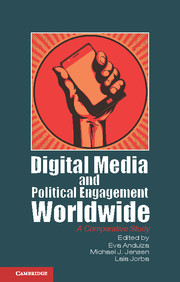Book contents
- Frontmatter
- Contents
- List of Tables and Figures
- Contributors
- Acknowledgments
- Introduction
- 1 The Impact of Digital Media on Citizenship from a Global Perspective
- 2 Recent Shifts in the Relationship between the Internet and Democratic Engagement in Britain and the United States
- 3 Political Engagement and the Internet in the 2008 U.S. Presidential Elections
- 4 Online Political Participation in the United States and Spain
- 5 Internet Use and Political Attitudes in Europe
- 6 Digital Media and Offline Political Participation in Spain
- 7 Online Participation in Italy
- 8 On the Causal Nature of the Relationship between Internet Access and Political Engagement
- 9 The Uses of Digital Media for Contentious Politics in Latin America
- 10 Opening Closed Regimes
- 11 Digital Media and Political Attitudes in China
- Conclusion
- References
- Index
Introduction
Published online by Cambridge University Press: 05 July 2012
- Frontmatter
- Contents
- List of Tables and Figures
- Contributors
- Acknowledgments
- Introduction
- 1 The Impact of Digital Media on Citizenship from a Global Perspective
- 2 Recent Shifts in the Relationship between the Internet and Democratic Engagement in Britain and the United States
- 3 Political Engagement and the Internet in the 2008 U.S. Presidential Elections
- 4 Online Political Participation in the United States and Spain
- 5 Internet Use and Political Attitudes in Europe
- 6 Digital Media and Offline Political Participation in Spain
- 7 Online Participation in Italy
- 8 On the Causal Nature of the Relationship between Internet Access and Political Engagement
- 9 The Uses of Digital Media for Contentious Politics in Latin America
- 10 Opening Closed Regimes
- 11 Digital Media and Political Attitudes in China
- Conclusion
- References
- Index
Summary
Research from the United States and United Kingdom over the past fifteen years shows an increasingly positive relationship between internet use and levels of political engagement. Although the effect might be small at times, more evolutionary than revolutionary, and require certain conditions, it is rarely contested that digital media have an impact on civic and political involvement (Boulianne 2009; Prior 2007; Jensen, Danziger, and Venkatesh 2007; Owen 2006). However, the mechanisms by which internet use makes political engagement more probable remain somewhat elusive. In addition, whether this effect can be observed in other, non Anglo-Saxon political systems is still largely an open question. This question is particularly important given recent events in the Islamic world, where mixed results in citizen-led revolutions have provoked different opinions regarding the consequences of digital media use for democratic politics (Morozov 2011; Zhuo, Wellman, and Yu 2011). To better understand the role of digital media in connecting individuals to the political system, the contributors of this volume examine different aspects of this relationship with a variety of data sources and methodological approaches in a number of diverse contexts.
First, the book analyzes different paths through which digital media are affecting political involvement among citizens. We argue that these paths are both direct and indirect. Digital media have opened new modes of engagement that previously did not exist and that can be used by citizens to express their political views and convey their interests. This book considers a wide variety of different political contexts and political activities available online, and it considers the impact of these activities both on political systems and, most important for our concerns, on citizens. Thus, this volume analyzes online involvement as a direct consequence of digital media use on the way citizens relate to their political environments and the indirect effects that result from internet use via changes in resources, attitudes, and traditional patterns of behavior.
- Type
- Chapter
- Information
- Digital Media and Political Engagement WorldwideA Comparative Study, pp. 1 - 15Publisher: Cambridge University PressPrint publication year: 2012
- 14
- Cited by

